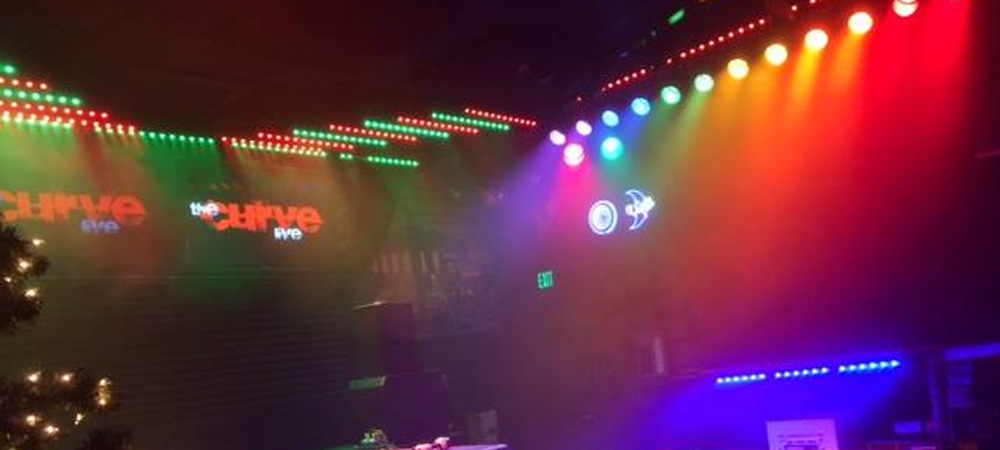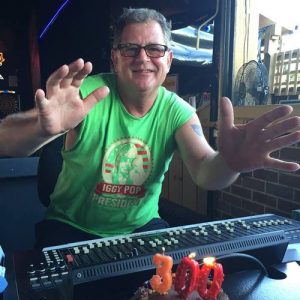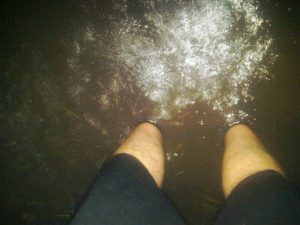Ric Major
Posted by Fun DMC on March 6th 2016

 How did you get started?
How did you get started?
My interest in Sound began around 8th grade (69-70). I borrowed a reel recorder from a science teacher at Franklin MS and followed Local bands around town recording them. Eventually, I got a Cassette recorder, and a little radio shack 4 channel mic mixer. After a few years of this, around ’74 Gene Bennett asked me to “adjust the PA” for his band White Wing. I was a Senior in HS at that point. Since then, it’s been a non stop blur of bands, venues & shows for over 40 years.
What’s your favorite show you’ve run sound for?
My favorite show…. This is like asking “What’s the favorite meal you’ve eaten in your life?” There have been so many. I was fortunate to have jumped in at an early time in the history of pop music, (early 70s) and I am lucky enough to still be working. A few highlights: Mixing a bunch of Grandstand Shows when I was 20, on the first Grandstand sound system that featured Subs. Mixing Monitors for Aretha Franklin. Mixing Ray Charles. Mixing John Lee Hooker, Albert Collins, Willie Dixon, and many other Blues Legends. 10 years of The Miller tent, over 200 band slots. Touring with Cats On Holiday, or Monterey, or Nashville’s The Floating Men. Working for a Sound company on a Cheap Trick tour. House gigs at Krickets/1518 East, The Atrium, and The Curve Inn.. It’s very difficult for me to put forth one gig as my favorite. Maybe I should say, my favorite gig is the one I’m doing today.
What piece of advice would you give to a new band to make the night go easier?
Advice to new bands: Have your own act together. Organization is key. Set up the same way every time to avoid confusion. Listen to the Venue owner, and the Sound guy. We all want to have a good show. Co-operation, with good communication is the best way to accomplish that.
What is your essential piece of gear?
I know it sounds a little trite, but my mind is the only piece of gear that I consider essential. Often, when touring, I’m walking in with NO gear, and using what’s provided. You make due with what you have. If I HAD to pick a single thing, it would be an audio analyzer or an analyzer program to help set the system eq.
What’s your biggest challenge at every gig?
The biggest challenge is generally Monitors. The never ending battle of More Me is difficult. The louder the stage, the more difficult it becomes. IEMs have helped this to an extent, but IEMs also have their own issues. Monitors aren’t easy, and many musicians have misconceptions that can make things even more difficult.
What’s the biggest unexpected catastrophe you have successfully overcome during an event?
There have been many. The first that comes to mind is the 2011 Sangamon County Fair flash flood. During the show, it rained steadily for two hours. After the rain stopped, we noticed water streaming on the ground into the tent. The stage area sits in a ‘bowl’, within 30 minutes the water level around the stage grew to be over a foot deep. The Amp rack and the subs were a foot deep in water. It was a mess. The water did not recede for a day, we had to tear down IN it. My life has been so full. my 2nd, 3rd and 4th catastrophes are all good stories, hated to leave anything out!


What song are you sick to death of hearing?
That’s a moving target. Last year it was Uptown Funk. When Katy Perry, Rick Springfield, and nearly every local band does the same tune, it will get a little old. But, I really don’t mind, there will probably be a new overdone tune this Summer.
What is your go-to song to crank for testing a system?
I don’t depend on a particular song that much. I analyze the system using Pink Noise as a reference. I’ll listen to something quiet, like Sade, No Ordinary Love, or some Chris Issac, to hear overall system clarity. To check the mids, I’ll listen to my own voice, using an SM58, through the Mains. That’s a trick I learned from Brian Ruggles, Billy Joel’s guy. Keith Urban’s guy does the same thing, but in an Aussie accent. I find it easy to hear hot (or missing) frequencies by simply speaking. As my general focus is always vocals first, it gives me a good starting point using a human voice.
